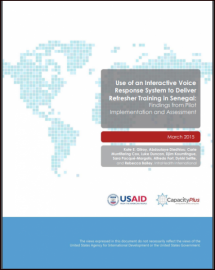Use of an Interactive Voice Response System to Deliver Refresher Training in Senegal: Findings from Pilot Implementation and Assessment
The USAD-funded CapacityPlus project, led by IntraHealth International, developed, deployed, and assessed an innovative mLearning system that used a combination of IVR and SMS text messaging to deliver refresher training to family planning providers in Senegal, focusing on management of contraceptive side effects and counseling to dispel misconceptions.
The course content, informed by initial training content and aligned with Senegal’s national family planning policies and international guidelines, was delivered using spaced education. Spaced education is a distance learning approach in which content is spaced and repeated over time and which has been found to increase retention of clinical knowledge and skills. The IVR mLearning training system used a set of custom scripts that manage interactions between open source IVR software tools and learning solutions, including Gammu, FreeSWITCH, and Moodle.
The project prioritized open source technologies because of their low cost and ability to undergo local adaptation more easily. The training content (20 multiple-choice questions and accompanying detailed explanations) was delivered to the trainees’ mobile phones and was compatible with all basic phone models. Each trainee specified a preferred time of day to receive a daily SMS text reminder to prompt a call. Whenever the trainee was available and ready—even if hours or days after the initial reminder—the trainee texted the mLearning system to prompt a call, then responded to audiorecorded questions using the phone’s keypad. The system indicated whether the answer was correct or incorrect and provided a detailed explanation via audio recording.
The pilot experience provides compelling evidence that the mLearning system should be scaled up to other family planning and health topics and geographic areas in Senegal and beyond. Close monitoring and rigorous effectiveness evaluation of larger-scale implementation can provide robust evidence that the IVR mLearning system is feasible and effective at scale.
Source: USAID
Date of Publication: December 18, 2019
SIMILIAR RESOURCES
Tools
Examples
- Why is IVR Important?
- Creating Mobile Health Solutions for Behaviour Change: A Study of Eight Services in the mNutrition Initiative Portfolio
- Interactive Voice Response and Radio for Peacebuilding: A Macro View of the Literature and Experiences from the Field
- mHealth Mobile Messaging Toolkit: Considerations When Selecting a Mobile Messaging Platform Vendor
- The mHealth Planning Guide: Key Considerations for Integrating Mobile Technology into Health Programs
- My Voice Service Improvement Platform
- Promoting Quality Malaria Medicines Through SBCC: An Implementation Kit
- SBCC for Malaria in Pregnancy: Strategy Development Guidance
- Malaria Case Management: Monitoring and Evaluation for SBCC
- Project m-Maitri: Interactive Voice Response (IVR) for Parent-to-Child Transmission
- Messages for Interactive Voice Response, Nigeria
- The Use of IVR to Support Monitoring and Evaluation of Media Interventions: A Case Study of the VOTO System in Rwanda
- How Digital Health Platforms Connect Women to Maternal Health Services
- Can Mobile Phone Surveys Replace House-To-House Data Collection?

